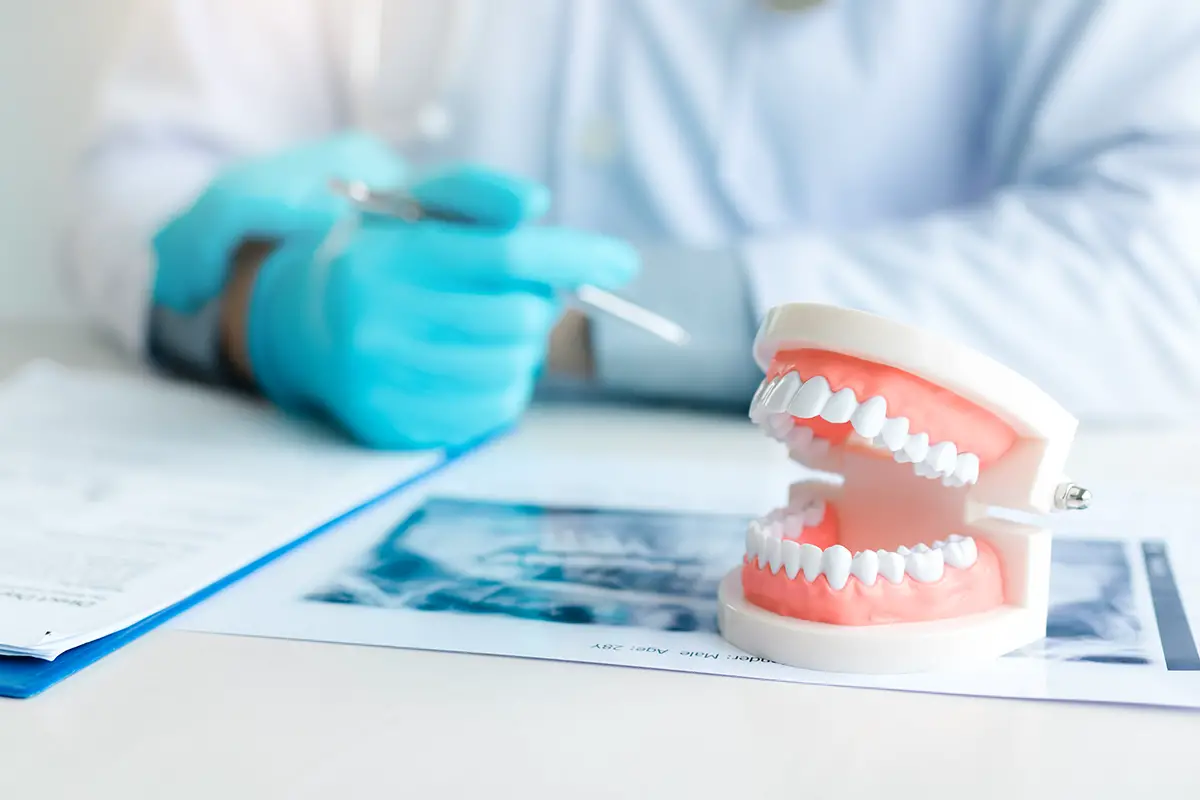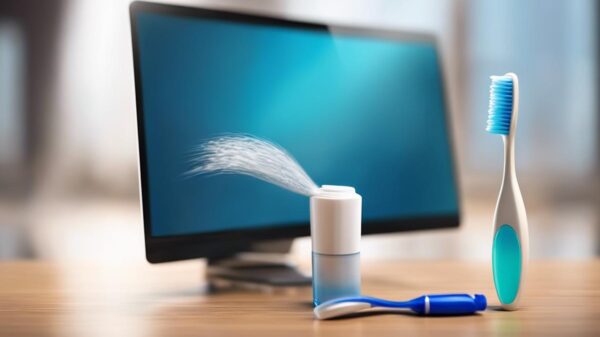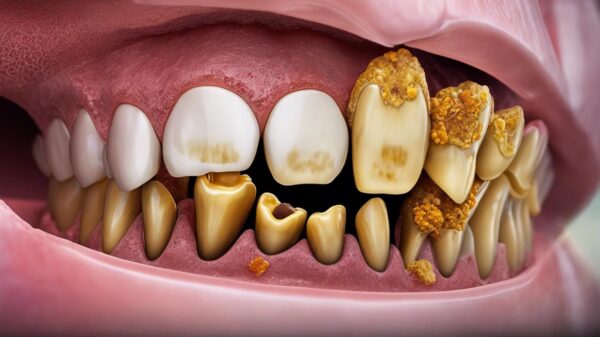The Do’s And Don’ts Of Denture Care
Losing your natural teeth is a major life adjustment, but with today’s modern dentures, you can feel like yourself again! Dentures serve many purposes and have great benefits to the wearer. However, they have specific care instructions that should be followed to prolong their life and prevent damage or pain. I have compiled a quick guide on the best care practices.
What is the best way to care for dentures?
- Keep your dentures in a glass of water when not wearing them.
- Don’t wear any denture that isn’t clean.
- Brush your dentures daily with a soft toothbrush and non-abrasive paste or gel to remove loose plaque, food particles, tartar build-up, etc…
- Avoid soaking your dentures in harsh, abrasive chemicals or cleaners.
- Don’t let food become lodged under any part of your denture.
- If you notice teeth loosening or falling out, don’t try to pop them back into place.
Caring for your dentures doesn’t need to be complicated. Simply follow the above guide and you should be able to enjoy your new smile for years to come. I’m sure you have more questions about denture care, as well as things to watch out for. So let’s get into it a bit more!
What To Do When Dentures Aren’t Being Worn
Since most people remove their dentures while they sleep, there is a large amount of time they aren’t being worn. The best way to store them is in a glass of water when they are not being worn. This will prevent your dentures from becoming loose and will keep them moist, preventing cracks or other damage that could affect their long-term wearability.
Brushing your dentures twice a day is also important. When you aren’t wearing them, do not let plaque, dirt, or food particles build upon their surfaces. This will make for a sour-tasting next time they are worn.
Cleaning them with a simple toothbrush and non-abrasive paste will keep your dentures in pristine condition. It is easier to brush them when they aren’t being worn because it is much easier to see what you are doing.
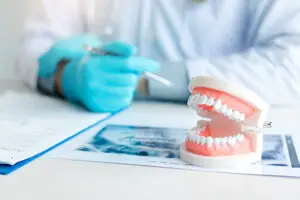 Problems With Dirty Dentures
Problems With Dirty Dentures
You will want to always avoid wearing dirty dentures. There are many different reasons for this.
- Dirty dentures can lead to gum disease.
- Bacteria is transferred more easily on uncleaned surfaces.
- Making your smile look less than ideal!
Having dirty or bacteria-covered dentures can be dangerous for your health and make you an easy target for infection. This doesn’t mean that food particles will cause instant tooth decay, but it doesn’t make for a friendly environment for bacteria to grow on. Keep your oral health in mind and brush your dentures regularly!
How To Brush Dentures
Many people assume it does not matter how you brush your dentures, but this could not be further from the truth! You want to brush them 1-2 times a day.
Here are a few tips to make sure you are brushing correctly:
- Use a soft-bristled toothbrush. Any harder and you will damage your dentures, much softer and they may not clean properly.
- Keep your toothbrush at a 45-degree angle. This way you can get to those hard-to-reach places on your dentures without hurting them.
- Use a gentle up and down motion as if you were painting the toothbrush on your dentures. This allows for maximum bristles to contact their surface, minimizing plaque and buildup that can lead to infections.
- Try to keep your toothbrush in the same place; this way you can monitor how much plaque, tartar, food particles, etc… are coming off the surfaces of your dentures.
- Don’t forget to brush the insides of your dentures! The insides are typically more concealed by the flesh, so many forget that this is an equally important part to keep clean.
Water Is Just Fine
When dentures are not being worn, they can be soaked in water. This will prevent them from becoming overly dry and cracking.
Some people like to use cleaning solutions for their dentures while they soak; it isn’t necessary, but may make your dentures appear newer. Keep in mind though to avoid using strong chemicals, like bleach or hydrogen peroxide. These will degrade your dentures much faster than water alone.
Soaking in harsher chemicals can also be harmful to you. The chemicals may get inside your mouth and cause damage to your soft tissue, leading to possible infections.
Keeping Food Out Of Your Dentures
When wearing your dentures, you will want to keep them as clean as possible. One of the best ways to do this is by keeping anything that can lodge itself inside of your mouth away from your dentures.
Don’t eat sticky or chewy foods with your teeth. These foods often get lodged between a person’s teeth and may cause irreparable damage to your dentures.
Keep a small trash can near you when wearing your dentures. Spit out anything that could potentially get stuck between your teeth and your dentures, such as food particles. Once again, this will also help prevent the buildup of bacteria on your dentures. This way, they will remain cleaner and protect you from illness more effectively!
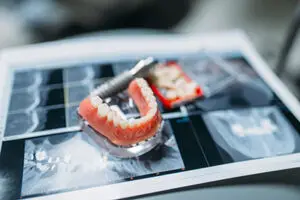 Don’t Try To Repair Dentures
Don’t Try To Repair Dentures
Many people will try to repair their dentures themselves. However, this may compound the problem further and can be very difficult if you are not an expert in these situations.
If your denture has a crack or wear-and-tear, take it back to your dentist for inspection. They can determine if they can fix the problem or if your entire denture needs to be replaced. If it is the latter, they will usually attempt to repair the denture again before replacing it.
You should replace your dentures every 5-7 years at a minimum, if not more frequently than this. The material used for today’s dentures are much better than those of older generations, so they can last a bit longer.
However, they may still become worn and unsightly, and it is good to be prepared for this contingency ahead of time.
Don’t Wear Damaged Dentures
Just as you shouldn’t repair your dentures, you shouldn’t wear damaged ones. If your dentures are worn or damaged, get them repaired before wearing them again.
You will want to wear dentures that are in good shape for several reasons.
- One of these is comfort. Wearing poorly-fitting or damaged dentures can be very uncomfortable and distracting.
- Additionally, poorly fitted teeth can cause you to over-stress your jaws, leading to TMJ disorders. Dentures that are too loose may cause you to develop similar problems as well.
- Another problem with damaged dentures is they can allow food particles, bacteria, and other materials to lodge between them and your gums or roof of the mouth. This can lead to infections, gum disease, etc…
You want to avoid these problems! Keep your dentures in their best condition by repairing any damage before wearing them again. If you notice any damage or anything strange, take them back to your dentist for help!
How Long Should My Dentures Last?
You are putting in the work and consistency of caring for them, so how long should your dentures last?
Typically, dentures should last five to ten years. However, your dentist may recommend replacing them earlier if you are experiencing problems with them or showing signs of gum disease or other dental issues.
A lot of this relates to how well you care for your dentures and take good care of yourself in general. If you do not keep track of your oral hygiene, you will find that your dentures age faster than they would otherwise.
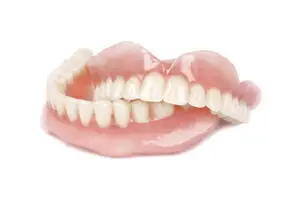 Soak In Cold Or Hot Water?
Soak In Cold Or Hot Water?
Most dentists would recommend soaking them in cold water. You can add some salt or baking soda to this water to help ensure that they are completely clean and sanitary, as well as to help remove stains.
A hot-water soak can damage your dentures, as boiling water can warp them and make them loose fitting. You should always keep your dentures out of the microwave and dishwasher too, as these appliances may also damage or warp them.
Don’t ever try heating or otherwise cleaning your dentures in any other way besides a cold or lukewarm water soak.
What Are Dentures Made Out Of?
Sometimes to take care of something, it helps to know what it is made out of.
Many dentures are made out of acrylic resin. Acrylic is a form of plastic that has two distinct advantages when used in dentures.
- The first is its colorfastness, which means the color will not fade over time.
- The second advantage is its ability to mimic natural teeth closely, such as textures and shapes.
Together, these two properties make it a great material for making dentures. Each manufacturer uses a different type of acrylic resin, which affects the strength and durability of their product. Some products are more durable than others, but even more expensive dentures may become damaged over time.
Do I Still Need To See The Dentist With Dentures?
Yes, you are still going to have regular dental checkups even if you wear dentures!
It is important to have regular dental checkups, regardless of whether or not you wear dentures. If you only see the dentist when your teeth start hurting or sores develop on your gums, problems can go undetected for a long time and be much harder to treat.
Even the best dentures will gradually wear out over time and become less comfortable or have other problems, so regular checkups are important for keeping them in top condition.
And that is all I have for you today! Keep both your mouth and dentures in good condition so you can continue being happy, healthy, and smiling for years to come!



